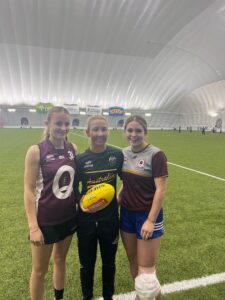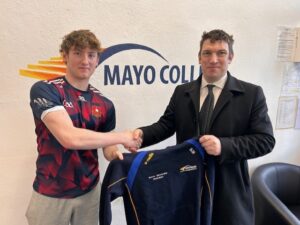Course Outline:
This Advanced Certificate in Sports, Recreation, and Exercise further explores the knowledge, skill and understanding of many aspects within the sport and recreation industry. The programme covers a broad range of topics within the fitness, health, and leisure industry, preparing learners to either seek employment or progress their studies at 3rd Level colleges in the area of Sport, Leisure and or Exercise Science. Practical elements of this course take place in The Movement gym, Castlebar. Successful students will receive a QQI Level 6 Advanced Certificate in Sports, Recreation & Exercise. Further qualifications offered with this award include:
- RLSS UK National Pool Lifeguard Qualification (NPLQ)
Course Content:
- Sports Industry Practice 6N4650
- Sports Nutrition 6N4651
- Sports Psychology 6N4665
- Event Management 6N4800
- Nutrition and Health 6N6065
- Exercise and Fitness 6N5345
- Communications 6N1950
- Work Experience 6N1946
Course Duration
This is a full-time one-year course which runs from September to May.
Entry Requirements:
A Leaving Certificate or equivalent is required, although exceptions are given to mature students who are over 23 years of age. Acceptance to the course is also based on an interview which takes place after applications have been submitted.
- Leaving Certificate, Leaving Certificate Applied, or equivalent
- Sports, Recreation and Physical Therapy Level 5 QQI Award, or equivalent
- Mature applicants with relevant experience are welcome
Careers and Further Progression:
There are a range of opportunities in the vocational area, this course prepares students for employment in: Sports Clubs, Leisure Centres, Gyms and Cruise Ships.
There are a wide range of progression opportunities available for FET graduates via the CAO website. Please view the entry requirements for all Higher Education colleges here: https://www.cao.ie/index.php?page=scoring&s=fetac
There are no fees to study this course.
Student Testimonial
“I completed the level 5 course in Sport and Exercise Science last year in Mayo college and felt it was a natural progression to apply for the Level 6 in Sport. The modules are really interesting and with subjects like Sports psychology, Sports Nutrition and Exercise and Fitness very applicable to enhancing my knowledge and interest in the Fitness Industry. I would highly recommend anyone thinking of doing the level 6 Sport, Recreaction and Exercise course , the course content is excellent and small class sizes means so much more attention to each student”.
Luke Lynch, Sports, Recreation and Exercise Level 6
Detailed Course Outline:
Sports Industry Practice – 6N4650
Aims to assist the learner to gain an understanding of the structure, procedures, functioning and rules and regulations within the sport, recreation and exercise sector. The purpose of this course is to equip the learner with the knowledge, skill, and competence in the legislation, guidelines, and practices relevant to a range of contexts in the sports industry.
- History and development of sport in Ireland
- Research and evaluation of existing Health and Safety legislation
- Analysis of current codes of practice, ethics with different NGB’s in the sports sector
- Review of current legislation and regulations
- Exploration of possible career paths
Assessment Techniques:
Examination – 40%, Assignments 60%
Sports Nutrition – Level 6N4651
This programme module aims to equip the learner with the knowledge, skill and competence in the concepts and principles underpinning nutrition, energy sources and energy usage within an active living, exercise, sports and or weight management context.
Course Objectives:
- Outline common terminology associated with nutrition and the nutritional requirements of active people
- Understand the role of the macro-nutrients as energy sources in exercise and sport
- Utilise and evaluate common methods for assessing energy intake and energy expenditure
- Design appropriate nutrition programmes for different sporting and weight management needs
- Understand the concepts involved in mineral and vitamin supplementation
- Discuss the effects of a range of nutritional ergogenic aids
- To assist the learner to develop the academic and vocational language, literacy and numeracy skills related to sports nutrition through the medium of the indicative content
- To enable the learner to exercise substantial personal autonomy and responsibility.
Assessment Techniques:
Project 50% Examination – Theory 30% , Assignment 20%
Sports Psychology – 6N4665
This QQI Level 6 Sport Psychology 6N4665 programme is designed to assist learners in understanding the psychological aspects of sport. It aims to equip learners with the skills and knowledge to understand and help change the behaviours of athletes in order to improve performance.
Sports Psychology Programme Aims:
- Understand the role of the sports psychologist
- Understand the relationship between sports psychology and performance
- Know how to design and deliver intervention strategies to improve sports performance (e.g. how to deal with anxiety)
- Evaluate different approaches to motivation in sport
- Understand the Influence of leaders and role models in sport.
Topics to be Covered:
- The Development of Sports Psychology
- Sports Psychology and Performance
- Arousal, Stress and Anxiety
- Concept of Motivation in Sport
- Goal Setting
- Leadership and Coaching.
Assessment Techniques:
Examination – 40%, Assignments 60%
Event Management – 6N4800
The course is designed for those working in Event Management companies, Large Companies, SMEs, Public Sector or community and voluntary sectors. The course covers all categories of events including Business Events, Exhibitions, Conferences, Festivals, Charity Events, Entertainment Events, Sports Events, and Private Social Events (e.g. weddings, parties).
Students will learn how to:
- develop event proposals for clients,
- develop innovative event concepts,
- conduct feasibility analysis for events,
- lead teams during events,
- manage suppliers and service providers,
- develop event plans, work breakdown and event schedule,
- develop quality management and risk plans, and
- develop skills for staging events.
Nutrition and Health – 6N6065
The purpose of this award is to equip the learner with the knowledge, skill and competence to understand and apply the principles of nutrition and healthy eating to include the provision of nutrition and healthy eating advice to individuals seeking to improve their diet for preventative purposes, for weight management, or for health conditions without a medical contraindication. Learners will be able to:
- Appraise the food groups, their nutritional profile and importance in the diet
- Assess the nutritional impact of refining and processing on core foods
- Appraise the principles of preventive healthcare through good nutrition
- Evaluate the issues around weight management and dietary choices
- Outline the process involved in profiling a person seeking dietary advice
- Assess the nutritional content of a range of foods and meals Evaluate an individual’s eating habits Offer basic dietary advice Plan healthy meals to include the selection of healthy foods 10 Reflect on the practice of offering dietary advice.
Exercise & Fitness – 6N5345
Furnishes the learner with the knowledge, skill and competence to work independently and or in an instructional capacity in an exercise, health and fitness environment
Course Description
- Describe the relevant aspects of anatomy and physiology as it applies to human movement
- Link between health fitness, lifestyle and wellness and the health benefits of improved fitness
- Apply the principles of training to the components of health related fitness
- Discuss the duties necessary to work in a variety of health fitness contexts
- Describe the four stages of developing an exercise programme
- Explain the reasons for warm up and cool down and the physiological effects of each
- Develop appropriate warm up and cool down routines that can be used in a range of exercise and fitness routines
- Describe a range of different training methods
- Develop the instructional skills needed to deliver classes in, exercise to music, resistance training, flexibility, circuit training and body conditioning, without supervision to small groups in general adult population
- Conduct the screening and informed consent process, to develop a fitness profile for a subject, through a range of basic and appropriate field tests
- Deal competently with adverse situations that might arise in a fitness environment from a simple injury to a life threatening situation.
Communications – 6N1950
Facilitates the learner to acquire excellent communication skills which will enable active and effective participation in vocational and personal life.
Learners who successfully complete this course will:
- heighten an awareness of the essential role played by communication in human interaction
- understand the communicative principles and practices involved in gathering and relaying information
- analyse the nature and theory of communication
- explore varieties of non-verbal communication
- acquire the skills and confidence required to encode and decode meaning, in writing, verbally and visually
- enhance and refine interactive skills and qualities.
Assessment: Portfolio / Collection of Work 50% / Skills Demonstrations 50%
Work Experience – 6N1946
Provides the learner with a comprehensive range of skills with detailed theoretical understanding of a general supervisory nature of the work placement in a specific vocational area. This module will provide you the opportunity to use and gain knowledge, skills and competencies to work in a suitable work placement under supervision. Work Experience is a planned experiential learning activity and is an integral part of an educational process. It involves learners preparing and planning for work, working under direction in a specific vocational area and reviewing and evaluating that work. The experience of work enables learners to develop work skills, evaluate employment opportunities and cope with changing work environments
- Examine work organisations and personal career opportunities in a particular vocational area, to include consideration of work-related issues and needs.
- Summarise the basic rights and responsibilities of employees and employers in a particular work, organisational or institutional context, to include health, safety and welfare at work, equality legislation, union representation and regulations relating to pay.
- Present relevant work experience material, to include a Curriculum Vitae or personal statement, letter of application, evidence of job-finding skills, skills checklist, statement of learning goals, contractual arrangements.
- Participate effectively in a work experience placement for a minimum of 60 hours to gain experience/insight into their chosen vocational area.
Assessment Criteria:
Collection of Work – 60%, Skills Demonstration – 40%







